| Srl | Item |
| 1 |
ID:
086795
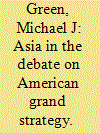

|
|
|
|
|
| Publication |
2009.
|
| Summary/Abstract |
The United States faces multiple national security challenges, but in the longer sweep of history it is our response to the rise of Chinese power that may have the greatest significance. Over the previous two centuries the Anglo-American-led neoliberal order faced three rising powers. Great Britain managed the rise of American power at the end of the nineteenth century, through a deft strategy of accommodation and co-option. However, the United States and Britain failed to prevent the rise of Japanese and German power from leading to a calamitous global conflict. In those cases both deterrence and accommodation failed. We thus face the prospect of rising Chinese power with a one-for-three record, and the one case of success was one in which the rising power shared the values of the preeminent power.
|
|
|
|
|
|
|
|
|
|
|
|
|
|
|
|
| 2 |
ID:
096014
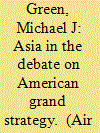

|
|
|
| 3 |
ID:
113127
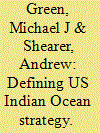

|
|
|
| 4 |
ID:
080907
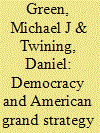

|
|
|
|
|
| Publication |
2008.
|
| Summary/Abstract |
Has democracy promotion been discredited as a central theme of American foreign policy after the US experience in Iraq? Many American critics and friends overseas appear to believe so. It would be wrong, however, to believe that the ideational approach of American foreign policy will diminish, particularly in Asia. First, there is not in fact a tension between the United States' material power and its ideals as a democracy. Second, post-Bush leaders identify and embrace the promotion of bilateral and multilateral cooperation among Asia-Pacific democracies as central to the United States' regional strategy. Third, and most important, democracy promotion and security cooperation among like-minded democracies will remain a central objective of American foreign policy in Asia because those elements magnify American power and facilitate US goals. In short, the ideational balance of power in Asia directly affects the material balance of power. This article examines these trends in American policy in Asia, the outlook for greater strategic and diplomatic cooperation among regional democracies, and the implications for the region, including China and ASEAN, of a US democracy-based approach to Asia policy.
|
|
|
|
|
|
|
|
|
|
|
|
|
|
|
|
| 5 |
ID:
083411


|
|
|
|
|
| Publication |
2008.
|
| Summary/Abstract |
Surprisingly, the war has not changed any fundamental elements of Asia's rising influence, nor has it significantly weakened the U.S. hand in the region in any enduring way. The reality is that the Iraq war has not been as fundamental to Asian geopolitics as it has in the Middle East or Europe
|
|
|
|
|
|
|
|
|
|
|
|
|
|
|
|
| 6 |
ID:
163782
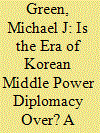

|
|
|
|
|
| Summary/Abstract |
A decade ago, Korea seemed poised to establish new leadership on global and
regional governance using “middle power diplomacy.” Korea hosted the G-20
leaders in Seoul in November 2010, the Fourth High Level Forum on Aid
Effectiveness (HLF-4) in Busan in November 2011; and the Nuclear Security
Summit with over 50 world leaders in attendance in March 2012. In 2013 Korea
joined Mexico, Indonesia, Turkey and Australia on the sidelines of the United
Nations General Assembly (UNGA) to form the MIKTA caucus of like-minded
middle powers. Yet experts generally agree that Korea’s middle power diplomacy
has lost momentum in recent years. Follow-up on these earlier summits has been
incomplete and more recent initiatives, such as President Park Geun-hye’s Northeast
Asia Peace and Cooperation Initiative (NAPCI) and President Moon Jae-in’s New
Northern and New Southern Diplomacies have failed to gain any traction. What
went wrong? An assessment of these various initiatives suggests that Korean-style
middle power diplomacy has suffered from three problems: capacity; geopolitics
and domestic political divisions. As Asia becomes more contested, Korea will need
to take a clearer stand in support of the neoliberal norms that have underpinned the
post-war international order. Early middle power strategies based on convening
and bridging will leave Seoul in a reactive and vulnerable position as geopolitical
competition increases.
|
|
|
|
|
|
|
|
|
|
|
|
|
|
|
|
| 7 |
ID:
093565
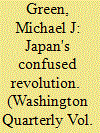

|
|
|
| 8 |
ID:
185063


|
|
|
|
|
| Publication |
New York, Columbia University Press, 2022.
|
| Description |
xi, 311p.pbk
|
| Standard Number |
9780231204675
|
|
|
|
|
|
|
|
|
|
|
|
Copies: C:1/I:0,R:0,Q:0
Circulation
| Accession# | Call# | Current Location | Status | Policy | Location |
| 060170 | 306.20952/GRE 060170 | Main | On Shelf | General | |
|
|
|
|
| 9 |
ID:
007026
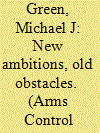

|
|
|
|
|
| Publication |
July-Aug 2000.
|
| Description |
17-24
|
|
|
|
|
|
|
|
|
|
|
|
|
|
|
|
| 10 |
ID:
074996
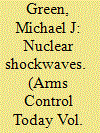

|
|
|
| 11 |
ID:
090188


|
|
|
|
|
| Publication |
2009.
|
| Summary/Abstract |
These days when North Korea conducts a nuclear or missile test, the preferred metaphor in Washington is to compare Kim Jong II to a spoiled child.President George W. Bush used to say the North's Dear Leader" was like a baby throwing food on the floor in the hope that the adults would pick it up.When asked about North Korea during a recent trip to the region, Secretary of State Hillary Clinton said that as a mother she was already familiar with small children acting out to gain attention.
|
|
|
|
|
|
|
|
|
|
|
|
|
|
|
|
| 12 |
ID:
142989


|
|
|
|
|
| Summary/Abstract |
In November 2011, President Barack Obama announced that the United States would rebalance to the Asia–Pacific region. Although this shift had been underway for years, experts across the Pacific generally welcomed Washington's increased attention. From the beginning, however, the U.S. Congress and governments in Asia have questioned whether the rebalance announcement was backed by the necessary resources and implementation strategy.
|
|
|
|
|
|
|
|
|
|
|
|
|
|
|
|
| 13 |
ID:
085524
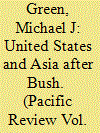

|
|
|
| 14 |
ID:
073808
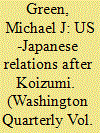

|
|
|
|
|
| Publication |
2006.
|
| Summary/Abstract |
Did the Bush-Koizumi personal connection mask underlying areas of divergence between the United States and Japan? A look at bilateral relations between leaders, Japan's external threat environment, common values, and economic relations gives some insight into the way ahead.
|
|
|
|
|
|
|
|
|
|
|
|
|
|
|
|